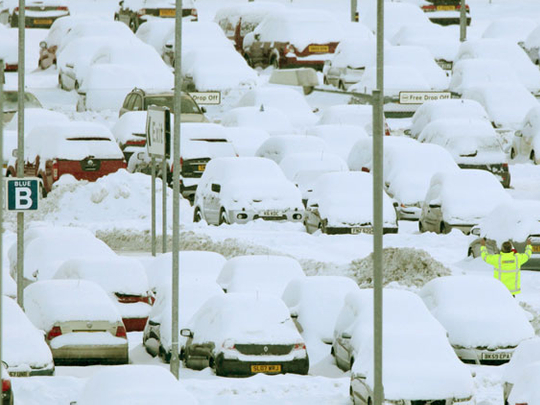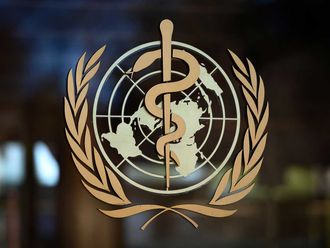
London: A cold snap across Europe has claimed at least 60 lives, authorities said Friday, as snow disrupted transport in Britain and serious flooding forced thousands of people to be evacuated in the Balkans.
Seventeen people died from the cold in Central Europe in the past 24 hours, bringing the total this week to 45. A further 11 died in Russia, plus three in France and one in Germany, according to local authorities.
At least 30 people, mainly homeless men, have died in Poland in the past week, and temperatures dropped to minus 15 degrees Celsius (five degrees Fahrenheit) overnight.
Temperatures plunged to minus 20 degrees Celsius (minus four Fahrenheit) in Braemar, Scotland, while Britain struggled to get back to its feet after days of transport chaos caused by bad weather.
London's Gatwick airport reopened on Friday after a two-day shutdown due to snow, but other airports including London Heathrow and Glasgow warned of more cancellations and delays.
Many trains were cancelled due to snow and travel by road was slow going, while around 2,000 schools remained closed.
Despite Gatwick finally clearing the runways, freezing fog meant flights would be limited and "delays and cancellations inevitable", Europe's eighth-busiest passenger airport said.
"It is likely to take a few days before flight schedules return to normal," it said.
Eurostar, which operates high-speed passenger trains linking London with Paris and Brussels, said it was running a revised timetable, with 17 services cancelled. It warned of delays through the weekend.
Britain's Transport Secretary Philip Hammond has ordered a review of how transport operators have coped with the cold snap.
A Downing Street spokeswoman said there were "no major concerns" over supplies of food, petrol, diesel or gas despite the continued freezing conditions, even though there were warnings of shortages in some newspapers.
Police in Newcastle in the northeast of England reminded locals to wear a coat when they hit the pubs this weekend. "Geordies" are famed for their indifference to cold weather.
But police in Chatham, southeast of London, were not amused when a woman called the emergency services to report the theft of a snowman.
In Germany a man in his sixties was found dead in the snow outside a savings bank in Leipzig.
Authorities ordered all drivers to equip their vehicles with winter tyres from Saturday, or face a penalty of up to 80 euros (105 dollars).
In France road restrictions introduced after snowfall in some areas were affecting one important seasonal trade: Christmas trees.
"With routes blocked, we must shift the delivery schedule and isn't due to improve in the next week," said Frederic Naudet of the association representing natural Christmas tree producers.
Temperatures in Moscow hit a low of minus 24 degrees Celsius (minus 11 Fahrenheit), the lowest for the season in decades, weather authorities said.
In the remote Evenk region in Siberia, temperatures were a crisp minus 51 degrees Celsius (minus 60 Fahrenheit).
Meanwhile in the Western Balkans, flooding caused by rivers swollen through heavy rainfall forced thousands of people from their homes in Albania, Bosnia, Serbia and Montenegro on Friday, officials said.
More than 7,000 people were moved to safer areas in Albania, where Prime Minister Sali Berisha described the situation as "very serious".
Thousands of houses were damaged and roads linking the capital Tirana to the north of the country were completely blocked, local authorities reported.
In Bosnia authorities declared a state of emergency after some 1,000 homes were flooded around the town of Bijeljina along the Drina river, the natural border between Bosnia and Serbia.
In Serbia, at least 1,400 people were evacuated from the town of Loznica. More than 3,000 more people were at risk from the flooding of the Drina in the area of Loznica, Serbia's interior ministry said.
In Montenegro around 1,300 people were evacuated due to the "unprecedented" floods that hit the country, Interior Minister Ivan Brajovic said.












